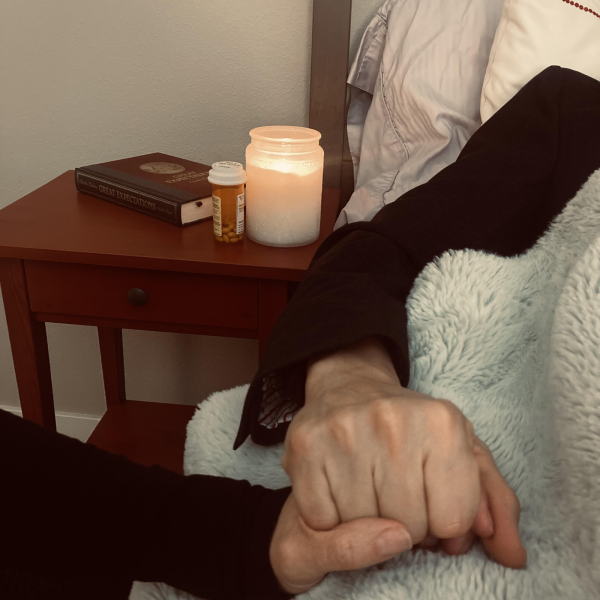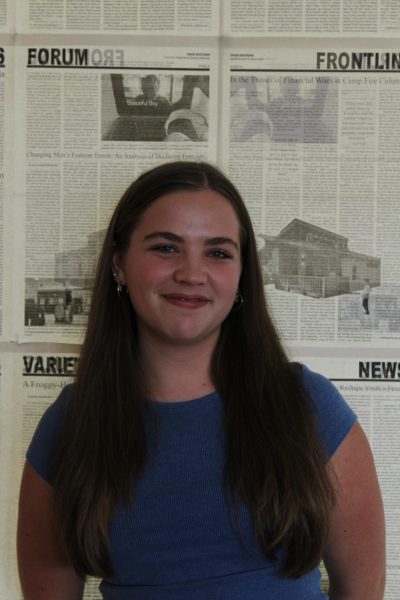
In a dark room, a woman lies in a bed, medical equipment humming in rhythm with her slow breaths. Outside, her daughter almost breaks down, unsure if she has minutes or days left with the person she loves. Tired, hungry, and emotionally fraught, she can only stay, assist as best she can, and wait.
Does death scare you? If so, you’re not alone. Death is something everyone born into this world experiences, yet there is no singular explanation for what happens before and after, and that unknown is frightening. Death anxiety is fairly common, whether an individual is concerned about their own death or the death of those they love.
There’s much more to death than the physical process of someone’s life ending. It causes a myriad of emotions, conflicts, and small details that need to be addressed. That burden is generally placed on those who are already struggling with their own grief. That’s where end-of-life doulas can come in.
Lindsay Compton, program coordinator for the Peaceful Presence Project, a nonprofit focused on end-of-life doulas, defines an end-of-life doula as a “compassionate companion who provides non-medical support and guidance to individuals and their loved ones as they navigate illness, dying, death, and grief.”
Over the last 15 years, where Americans die has shifted from hospitals and facilities to their own homes. A study published in the New England Journal of Medicine found that by 2017, 31% of Americans died at home, making it the most common site of death for the first time in a decade. With this change comes a demand for additional outside assistance, such as end-of-life doulas.
Some believe that making dying less of an illicit topic will help lessen the stigma and fear around death. “Death is this thing that people are so afraid to talk about, until it’s too late,” states Compton. Having discussions to address and plan for death can mitigate that fear. Compton explains that when individuals can “have those conversations and make a plan ahead of time, then it’s not something that’s so scary, and it’s something that people can prepare for a little bit easier.”
Preparation doesn’t have to be negative or morbid. In Oregon, as early as 18, you can fill out an Advanced Directive — a written legal document that outlines individual wishes and preferences for medical treatments, including end-of-life care, in the event that you cannot speak for yourself. Going through this process can present an opportunity to think through your feelings and wishes, and have honest conversations with loved ones about what’s important to them and to you.
Dying is an expensive event. According to Sarah Chavez, executive director of the Order of the Good Death, an organization that supports and advocates for alternative forms of death care, the U.S. funeral market’s estimated annual worth is $20 billion, and navigating the system can be emotionally and financially draining. The Federal Trade Commission found that some funeral homes provided inconsistent pricing information, and others failed to provide pricing entirely.
During such an overwhelming time, having someone to help navigate the details can provide clarity and a measure of relief. Chavez explains, “Doulas can do the often challenging chore of obtaining price lists, liaise with funeral homes, and help families understand the difference between services they truly need and avoid paying for ones they don’t, which often isn’t clear.”
Death can also be isolating. End-of-life workers can provide solace and connections for those who may not have living families or present friends to support them. Compton tells the story of a client who spent her last day in a memory care facility without any family, explaining, “We were able to bring in enough doulas to sit at her bedside as she was dying, so that she wasn’t alone.”
This type of support can also aid family and friends overwhelmed by grief, whether by giving them the space to take care of often neglected physical needs like sleep and food, or by helping them process some of their emotions.
Of course, being with death regularly can be challenging for end-of-life doulas as well. Tiffany Baker, the owner and founder of Hallowed Harvest End-of-Life Doulas, explains that during their training, doulas face their mortality and grieve those who have died in their lives. She explains, “It is essential that we be with ourselves before we offer to be with another person,” adding, “The deep self-knowledge and honesty that is required for this work is the key to not becoming overwhelmed by other people’s fears, stress, anger, sadness, and grief.”
Death will never be a wholly positive thing, but taking the time to figure out a personalized plan, access needed support, and have important conversations with loved ones can help make it less frightening and unknown. “Those conversations can be difficult, but they don’t have to be,” argues Compton. “Talking about death doesn’t make it happen any sooner — it just means everyone can feel a little more prepared.” Baker agrees that facing mortality can lower fear, saying, “Being with death helps us to live.”
Spending so much time with those who are dying shifts perspective on life. That may manifest as treasuring interpersonal moments more, an increased appreciation for good health, or an added resolve to reach a goal or improve a relationship. “It has taught me to have so much more gratitude than I did before,” says Compton. “You get to see how beautiful and precious life really is.”


































